#FOR IPS
Explore tagged Tumblr posts
Text
mad take, but I can't with how the "Vivzie hate club" has two brain cells:
how dare this character be absolutely vulgar, vile, sexist, toxic, and a meanie. This show is terrible, and is teaching children terrible things. I don't care if this is hell, this is wrong and I hate.
but also
how dare this character of gluttony not look like a swol fly. This is not biblically accurate character design. How dare the deadly sins not behave in a cliche way that I have come to expect after watching 50 marvel movies. This free show is terrible and I hate.
#helluva boss#hazbin hotel#waiting patiently for the [I was a part of Vivzies team and everything was terrible here is my pdf of carefully catered content] bomb#maybe this was so unexpected the disgruntled worker didn't have the mad tea edited up in a neat little framed package#seriously ken draws was an FULL ADULT and a manipulator dude was toxic as all hell#i hope no one else got tangled up with them especially minors cause that person was toxic#a 5 HOUR PHONE CHAT OVER A BASIC LEGAL DOCUMENT#FOR IPS#30 AND COULDNT INTERPRET A LEGAL DOCUMENT#A SHORT TERM RUNDAMENTARY LEGAL DOCUMENT FOR IPS#I did read the pdf ken provided and.... they come across as an absolute nightmare to work with
110 notes
·
View notes
Text
“If buying isn’t owning, piracy isn’t stealing”
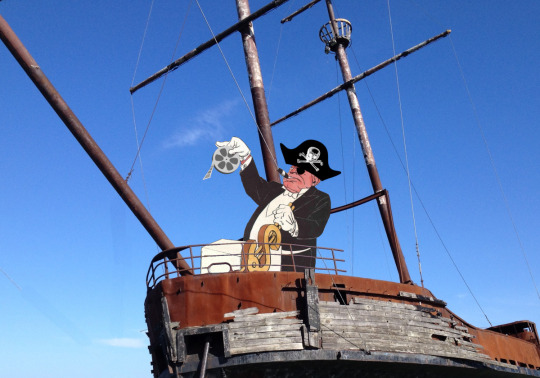
20 years ago, I got in a (friendly) public spat with Chris Anderson, who was then the editor in chief of Wired. I'd publicly noted my disappointment with glowing Wired reviews of DRM-encumbered digital devices, prompting Anderson to call me unrealistic for expecting the magazine to condemn gadgets for their DRM:
https://longtail.typepad.com/the_long_tail/2004/12/is_drm_evil.html
I replied in public, telling him that he'd misunderstood. This wasn't an issue of ideological purity – it was about good reviewing practice. Wired was telling readers to buy a product because it had features x, y and z, but at any time in the future, without warning, without recourse, the vendor could switch off any of those features:
https://memex.craphound.com/2004/12/29/cory-responds-to-wired-editor-on-drm/
I proposed that all Wired endorsements for DRM-encumbered products should come with this disclaimer:
WARNING: THIS DEVICE’S FEATURES ARE SUBJECT TO REVOCATION WITHOUT NOTICE, ACCORDING TO TERMS SET OUT IN SECRET NEGOTIATIONS. YOUR INVESTMENT IS CONTINGENT ON THE GOODWILL OF THE WORLD’S MOST PARANOID, TECHNOPHOBIC ENTERTAINMENT EXECS. THIS DEVICE AND DEVICES LIKE IT ARE TYPICALLY USED TO CHARGE YOU FOR THINGS YOU USED TO GET FOR FREE — BE SURE TO FACTOR IN THE PRICE OF BUYING ALL YOUR MEDIA OVER AND OVER AGAIN. AT NO TIME IN HISTORY HAS ANY ENTERTAINMENT COMPANY GOTTEN A SWEET DEAL LIKE THIS FROM THE ELECTRONICS PEOPLE, BUT THIS TIME THEY’RE GETTING A TOTAL WALK. HERE, PUT THIS IN YOUR MOUTH, IT’LL MUFFLE YOUR WHIMPERS.
Wired didn't take me up on this suggestion.
But I was right. The ability to change features, prices, and availability of things you've already paid for is a powerful temptation to corporations. Inkjet printers were always a sleazy business, but once these printers got directly connected to the internet, companies like HP started pushing out "security updates" that modified your printer to make it reject the third-party ink you'd paid for:
https://www.eff.org/deeplinks/2020/11/ink-stained-wretches-battle-soul-digital-freedom-taking-place-inside-your-printer
Now, this scam wouldn't work if you could just put things back the way they were before the "update," which is where the DRM comes in. A thicket of IP laws make reverse-engineering DRM-encumbered products into a felony. Combine always-on network access with indiscriminate criminalization of user modification, and the enshittification will follow, as surely as night follows day.
This is the root of all the right to repair shenanigans. Sure, companies withhold access to diagnostic codes and parts, but codes can be extracted and parts can be cloned. The real teeth in blocking repair comes from the law, not the tech. The company that makes McDonald's wildly unreliable McFlurry machines makes a fortune charging franchisees to fix these eternally broken appliances. When a third party threatened this racket by reverse-engineering the DRM that blocked independent repair, they got buried in legal threats:
https://pluralistic.net/2021/04/20/euthanize-rentier-enablers/#cold-war
Everybody loves this racket. In Poland, a team of security researchers at the OhMyHack conference just presented their teardown of the anti-repair features in NEWAG Impuls locomotives. NEWAG boobytrapped their trains to try and detect if they've been independently serviced, and to respond to any unauthorized repairs by bricking themselves:
https://mamot.fr/@[email protected]/111528162905209453
Poland is part of the EU, meaning that they are required to uphold the provisions of the 2001 EU Copyright Directive, including Article 6, which bans this kind of reverse-engineering. The researchers are planning to present their work again at the Chaos Communications Congress in Hamburg this month – Germany is also a party to the EUCD. The threat to researchers from presenting this work is real – but so is the threat to conferences that host them:
https://www.cnet.com/tech/services-and-software/researchers-face-legal-threats-over-sdmi-hack/
20 years ago, Chris Anderson told me that it was unrealistic to expect tech companies to refuse demands for DRM from the entertainment companies whose media they hoped to play. My argument – then and now – was that any tech company that sells you a gadget that can have its features revoked is defrauding you. You're paying for x, y and z – and if they are contractually required to remove x and y on demand, they are selling you something that you can't rely on, without making that clear to you.
But it's worse than that. When a tech company designs a device for remote, irreversible, nonconsensual downgrades, they invite both external and internal parties to demand those downgrades. Like Pavel Chekov says, a phaser on the bridge in Act I is going to go off by Act III. Selling a product that can be remotely, irreversibly, nonconsensually downgraded inevitably results in the worst person at the product-planning meeting proposing to do so. The fact that there are no penalties for doing so makes it impossible for the better people in that meeting to win the ensuing argument, leading to the moral injury of seeing a product you care about reduced to a pile of shit:
https://pluralistic.net/2023/11/25/moral-injury/#enshittification
But even if everyone at that table is a swell egg who wouldn't dream of enshittifying the product, the existence of a remote, irreversible, nonconsensual downgrade feature makes the product vulnerable to external actors who will demand that it be used. Back in 2022, Adobe informed its customers that it had lost its deal to include Pantone colors in Photoshop, Illustrator and other "software as a service" packages. As a result, users would now have to start paying a monthly fee to see their own, completed images. Fail to pay the fee and all the Pantone-coded pixels in your artwork would just show up as black:
https://pluralistic.net/2022/10/28/fade-to-black/#trust-the-process
Adobe blamed this on Pantone, and there was lots of speculation about what had happened. Had Pantone jacked up its price to Adobe, so Adobe passed the price on to its users in the hopes of embarrassing Pantone? Who knows? Who can know? That's the point: you invested in Photoshop, you spent money and time creating images with it, but you have no way to know whether or how you'll be able to access those images in the future. Those terms can change at any time, and if you don't like it, you can go fuck yourself.
These companies are all run by CEOs who got their MBAs at Darth Vader University, where the first lesson is "I have altered the deal, pray I don't alter it further." Adobe chose to design its software so it would be vulnerable to this kind of demand, and then its customers paid for that choice. Sure, Pantone are dicks, but this is Adobe's fault. They stuck a KICK ME sign to your back, and Pantone obliged.
This keeps happening and it's gonna keep happening. Last week, Playstation owners who'd bought (or "bought") Warner TV shows got messages telling them that Warner had walked away from its deal to sell videos through the Playstation store, and so all the videos they'd paid for were going to be deleted forever. They wouldn't even get refunds (to be clear, refunds would also be bullshit – when I was a bookseller, I didn't get to break into your house and steal the books I'd sold you, not even if I left some cash on your kitchen table).
Sure, Warner is an unbelievably shitty company run by the single most guillotineable executive in all of Southern California, the loathsome David Zaslav, who oversaw the merger of Warner with Discovery. Zaslav is the creep who figured out that he could make more money cancelling completed movies and TV shows and taking a tax writeoff than he stood to make by releasing them:
https://aftermath.site/there-is-no-piracy-without-ownership
Imagine putting years of your life into making a program – showing up on set at 5AM and leaving your kids to get their own breakfast, performing stunts that could maim or kill you, working 16-hour days during the acute phase of the covid pandemic and driving home in the night, only to have this absolute turd of a man delete the program before anyone could see it, forever, to get a minor tax advantage. Talk about moral injury!
But without Sony's complicity in designing a remote, irreversible, nonconsensual downgrade feature into the Playstation, Zaslav's war on art and creative workers would be limited to material that hadn't been released yet. Thanks to Sony's awful choices, David Zaslav can break into your house, steal your movies – and he doesn't even have to leave a twenty on your kitchen table.
The point here – the point I made 20 years ago to Chris Anderson – is that this is the foreseeable, inevitable result of designing devices for remote, irreversible, nonconsensual downgrades. Anyone who was paying attention should have figured that out in the GW Bush administration. Anyone who does this today? Absolute flaming garbage.
Sure, Zaslav deserves to be staked out over an anthill and slathered in high-fructose corn syrup. But save the next anthill for the Sony exec who shipped a product that would let Zaslav come into your home and rob you. That piece of shit knew what they were doing and they did it anyway. Fuck them. Sideways. With a brick.
Meanwhile, the studios keep making the case for stealing movies rather than paying for them. As Tyler James Hill wrote: "If buying isn't owning, piracy isn't stealing":
https://bsky.app/profile/tylerjameshill.bsky.social/post/3kflw2lvam42n

If you'd like an essay-formatted version of this post to read or share, here's a link to it on pluralistic.net, my surveillance-free, ad-free, tracker-free blog:
https://pluralistic.net/2023/12/08/playstationed/#tyler-james-hill

Image: Alan Levine (modified) https://pxhere.com/en/photo/218986
CC BY 2.0 https://creativecommons.org/licenses/by/2.0/
#pluralistic#playstation#sony#copyright#copyfight#drm#monopoly#enshittification#batgirl#road runner#financiazation#the end of ownership#ip
23K notes
·
View notes
Text

Been feeling frustrated recently
Feel free to read more about it: https://x.com/trendasia_org/status/1826241657169436841?s=46
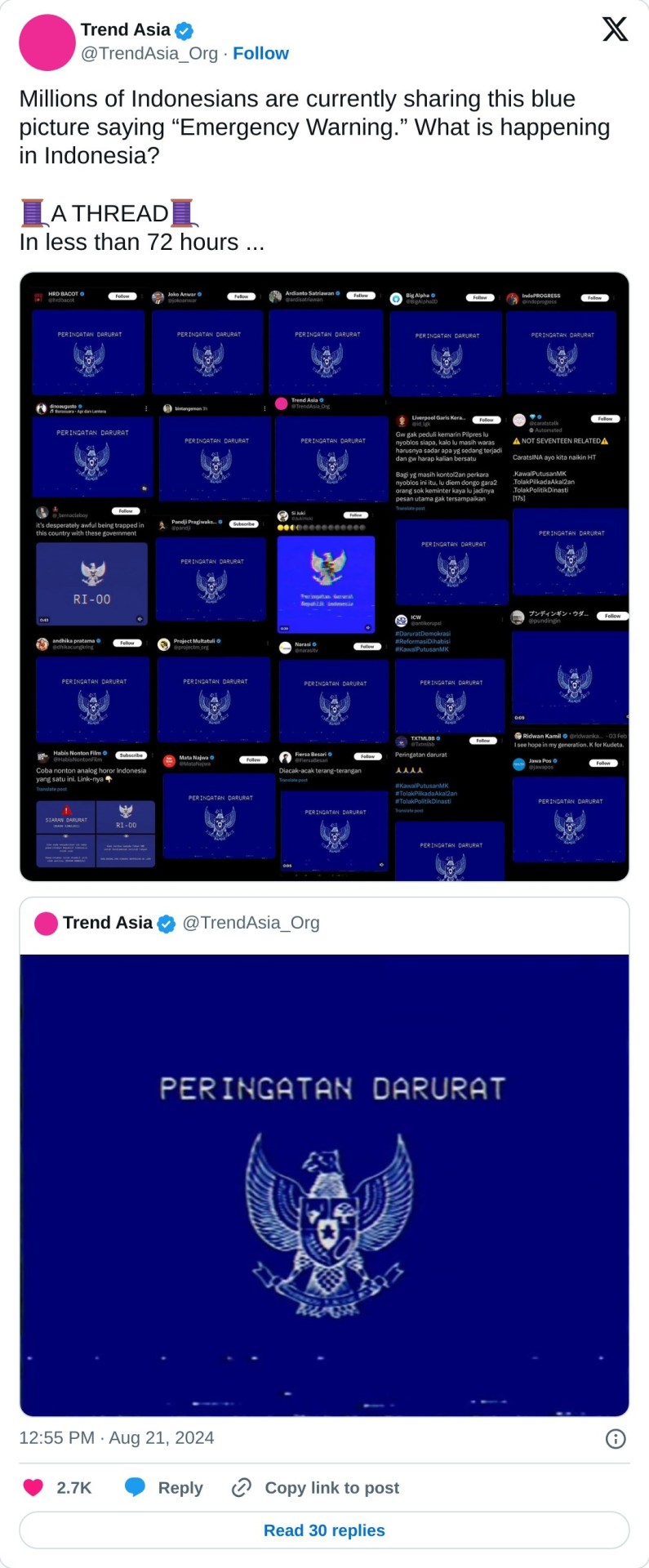
#my country is in shambles#the government is attempting to change the constitution so the current president’s son can be elected#basically trying to change the age restriction. his first son already won the presidential election as the vice president.#using character with IP is not advisable so I draw this one without any flags/symbols/slogans#but people who knows will know#genshin impact#my art#fanart#kaeya alberich#kaeya
4K notes
·
View notes
Text
(X)
i’m going to let this video speak for itself. bc i don’t even know what to say anymore. i don’t know how we come back from this level of radicalization among young people to the point where holocaust denial has become the norm.
3K notes
·
View notes
Text

My new hobby is buying plants from yard sales and today i bought one from a charming woman with a very thick accent
#fanart not an endorsement of the ip holder or his opinions#i know this is exactly the same as the scutes comic but i like puns#good omens#mygoart#i try to encourage my plants u_u
5K notes
·
View notes
Text

Very important conversations happening in the party chat
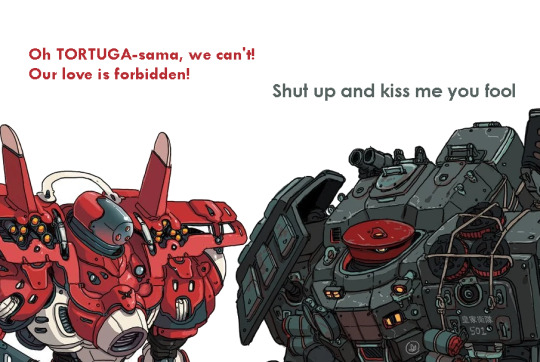
Tortuga has a Monarch-red helmet Monarch has a Tortuga-grey visor
It's official™ Forbidden Romance. Their +1 tech attack is so they can send each other love letters through company firewalls.
1K notes
·
View notes
Text

#ips-n blackbeard#ips-n#lancer#lancer rpg#lancerrpg#lancer-rpg#homestuck#inside out#terezi pyrope#blackbeard#i don't think you qualify as an emotion
1K notes
·
View notes
Text
I've walked past the Barbie branded selfie booth, sat through the reel of old commercials that precede the previews, and watched Margot Robbie learn to cry, and I’m still not sure what “doing the thing and subverting the thing,” which Greta Gerwig claimed as the achievement of Barbie in a recent New York Times Magazine profile, could possibly mean. This was the second Gerwig profile the magazine has run. I wrote the first one, in 2017, which in hindsight appears like a warning shot in a publicity campaign that has cemented Gerwig’s reputation as so charming and pure of heart that any choice (we used to call them compromises) she makes is justified, a priori, by her innocence. This is a strange position for an adult to occupy, especially when the two-hour piece of branded content she is currently promoting hinges on a character who discovers that her own innocence is the false product of a fallen world. But—spoiler alert!—the point of Barbie’s “hero’s journey” is less to reconcile Barbie to death than to reconcile the viewer to culture in the age of IP.
“Doing the thing and subverting the thing”: I haven’t finished working out the details, but I think the rough translation would be Getting rich and not feeling feel bad about it. (Or, for the viewer: Having a good time and not feeling bad about it.) One must labor under a rather reduced sense of the word “subvert” to be impressed with poking loving fun at product misfires such as Midge (the pregnant Barbie), Tanner (the dog who poops), and the Ken with the earring, especially given that the value of all these collectors’ items has, presumably, not decreased since the film opened. Barbie may feature a sassy tween sternly informing Robbie’s Stereotypical Barbie that the tiny-waisted top-heavy billion-dollar business she represents has made girls “feel bad” about themselves, but if anyone uttered the word “anorexia,” I missed it. (There was a reason Todd Haynes told the story of Karen Carpenter’s life and death with Barbies, and it wasn’t because an uncanny piece of molded plastic has the magical power to resolve the contradictions of girlhood and global capitalism.) There’s a bit about Robbie going back into a box in the Mattel boardroom, but Barbies aren’t made in an executive suite; they come from factories in China. On the one hand, it’s weird for a film about a real-world commodity to unfold wholly in the realm of ideas and feelings, but then again, that’s pretty much the definition of branding. Mattel doesn’t care if we buy Barbie dolls—they’re happy to put the word “Barbie” on sunglasses and T-shirts, or license clips from the movie for an ad for Google. OK, here’s my review: When Gerwig first visited Mattel HQ in October 2019, the company’s stock was trading at less than twelve dollars a share. Today the price is $21.40.
Christine Smallwood, Who Was Barbie?
9K notes
·
View notes
Text

speaking of mixing hyperfixations, i always thought britney’s toxic outfit was very donald-coded
#donald duck#britney spears#and to everyone who didn’t have donald duck dressed as britney spears on their bingo card for this year#don’t you feel foolish now.#if I had a nickel for every time I’ve drawn funny little guys with anger issues who are also disney ips#in britney’s outfit from the toxic music video . I’d have two nickels. whi
2K notes
·
View notes
Text
923 notes
·
View notes
Text

the c in chilchuck stands for cunty
#me when i post cringe#dungeon meshi#chilchuck tims#i am going to regret posting this tomorrow BUT FUCK IT WE BALLLJKJRLFLJGIFHRIOWGHRUOIGTJIO#$IP#Iorik34u59i2-430294p3ketieo aaaaaaaaaaaaaaaaa#i need to kms
2K notes
·
View notes
Text
It all started with a mouse
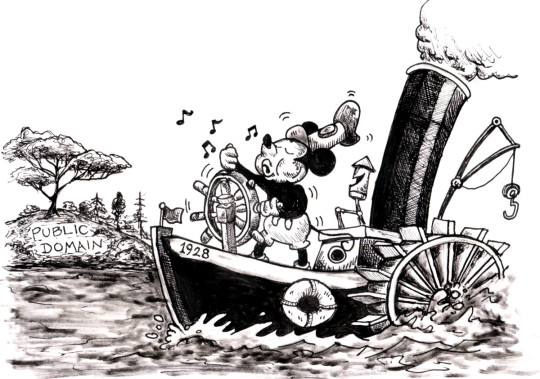
For the public domain, time stopped in 1998, when the Sonny Bono Copyright Act froze copyright expirations for 20 years. In 2019, time started again, with a massive crop of works from 1923 returning to the public domain, free for all to use and adapt:
https://web.law.duke.edu/cspd/publicdomainday/2019/
No one is better at conveying the power of the public domain than Jennifer Jenkins and James Boyle, who run the Duke Center for the Study of the Public Domain. For years leading up to 2019, the pair published an annual roundup of what we would have gotten from the public domain in a universe where the 1998 Act never passed. Since 2019, they've switched to celebrating what we're actually getting each year. Last year's was a banger:
https://pluralistic.net/2022/12/20/free-for-2023/#oy-canada
But while there's been moderate excitement at the publicdomainification of "Yes, We Have No Bananas," AA Milne's "Now We Are Six," and Sherlock Holmes, the main event that everyone's anticipated arrives on January 1, 2024, when Mickey Mouse enters the public domain.
The first appearance of Mickey Mouse was in 1928's Steamboat Willie. Disney was critical to the lobbying efforts that extended copyright in 1976 and again in 1998, so much so that the 1998 Act is sometimes called the Mickey Mouse Protection Act. Disney and its allies were so effective at securing these regulatory gifts that many people doubted that this day would ever come. Surely Disney would secure another retrospective copyright term extension before Jan 1, 2024. I had long arguments with comrades about this – people like Project Gutenberg founder Michael S Hart (RIP) were fatalistically certain the public domain would never come back.
But they were wrong. The public outrage over copyright term extensions came too late to stave off the slow-motion arson of the 1976 and 1998 Acts, but it was sufficient to keep a third extension away from the USA. Canada wasn't so lucky: Justin Trudeau let Trump bully him into taking 20 years' worth of works out of Canada's public domain in the revised NAFTA agreement, making swathes of works by living Canadian authors illegal at the stroke of a pen, in a gift to the distant descendants of long-dead foreign authors.
Now, with Mickey's liberation bare days away, there's a mounting sense of excitement and unease. Will Mickey actually be free? The answer is a resounding YES! (albeit with a few caveats). In a prelude to this year's public domain roundup, Jennifer Jenkins has published a full and delightful guide to The Mouse and IP from Jan 1 on:
https://web.law.duke.edu/cspd/mickey/
Disney loves the public domain. Its best-loved works, from The Sorcerer's Apprentice to Sleeping Beauty, Pinnocchio to The Little Mermaid, are gorgeous, thoughtful, and lively reworkings of material from the public domain. Disney loves the public domain – we just wish it would share.
Disney loves copyright's other flexibilities, too, like fair use. Walt told the papers that he took his inspiration for Steamboat Willie from Charlie Chaplin and Douglas Fairbanks, making fair use of their performances to imbue Mickey with his mischief and derring do. Disney loves fair use – we just wish it would share.
Disney loves copyright's limitations. Steamboat Willie was inspired by Buster Keaton's silent film Steamboat Bill (titles aren't copyrightable). Disney loves copyright's limitations – we just wish it would share.
As Jenkins writes, Disney's relationship to copyright is wildly contradictory. It's the poster child for the public domain's power as a source of inspiration for worthy (and profitable) new works. It's also the chief villain in the impoverishment and near-extinction of the public domain. Truly, every pirate wants to be an admiral.
Disney's reliance on – and sabotage of – the public domain is ironic. Jenkins compares it to "an oil company relying on solar power to run its rigs." Come January 1, Disney will have to share.
Now, if you've heard anything about this, you've probably been told that Mickey isn't really entering the public domain. Between trademark claims and later copyrightable elements of Mickey's design, Mickey's status will be too complex to understand. That's totally wrong.

Jenkins illustrates the relationship between these three elements in (what else) a Mickey-shaped Venn diagram. Topline: you can use all the elements of Mickey that are present in Steamboat Willie, along with some elements that were added later, provided that you make it clear that your work isn't affiliated with Disney.
Let's unpack that. The copyrightable status of a character used to be vague and complex, but several high-profile cases have brought clarity to the question. The big one is Les Klinger's case against the Arthur Conan Doyle estate over Sherlock Holmes. That case established that when a character appears in both public domain and copyrighted works, the character is in the public domain, and you are "free to copy story elements from the public domain works":
https://freesherlock.files.wordpress.com/2013/12/klinger-order-on-motion-for-summary-judgment-c.pdf
This case was appealed all the way to the Supreme Court, who declined to hear it. It's settled law.
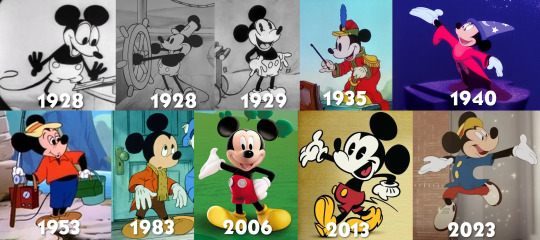
So, which parts of Mickey aren't going into the public domain? Elements that came later: white gloves, color. But that doesn't mean you can't add different gloves, or different colorways. The idea of a eyes with pupils is not copyrightable – only the specific eyes that Disney added.
Other later elements that don't qualify for copyright: a squeaky mouse voice, being adorable, doing jaunty dances, etc. These are all generic characteristics of cartoon mice, and they're free for you to use. Jenkins is more cautious on whether you can give your Mickey red shorts. She judges that "a single, bright, primary color for an article of clothing does not meet the copyrightability threshold" but without settled law, you might wanna change the colors.
But what about trademark? For years, Disney has included a clip from Steamboat Willie at the start of each of its films. Many observers characterized this as a bid to create a de facto perpetual copyright, by making Steamboat Willie inescapably associated with products from Disney, weaving an impassable web of trademark tripwires around it.
But trademark doesn't prevent you from using Steamboat Willie. It only prevents you from misleading consumers "into thinking your work is produced or sponsored by Disney." Trademarks don't expire so long as they're in use, but uses that don't create confusion are fair game under trademark.
Copyrights and trademarks can overlap. Mickey Mouse is a copyrighted character, but he's also an indicator that a product or service is associated with Disney. While Mickey's copyright expires in a couple weeks, his trademark doesn't. What happens to an out-of-copyright work that is still a trademark?
Luckily for us, this is also a thoroughly settled case. As in, this question was resolved in a unanimous 2000 Supreme Court ruling, Dastar v. Twentieth Century Fox. A live trademark does not extend an expired copyright. As the Supremes said:
[This would] create a species of mutant copyright law that limits the public’s federal right to copy and to use expired copyrights.
This elaborates on the Ninth Circuit's 1996 Maljack Prods v Goodtimes Home Video Corp:
[Trademark][ cannot be used to circumvent copyright law. If material covered by copyright law has passed into the public domain, it cannot then be protected by the Lanham Act without rendering the Copyright Act a nullity.
Despite what you might have heard, there is no ambiguity here. Copyrights can't be extended through trademark. Period. Unanimous Supreme Court Decision. Boom. End of story. Done.
But even so, there are trademark considerations in how you use Steamboat Willie after Jan 1, but these considerations are about protecting the public, not Disney shareholders. Your uses can't be misleading. People who buy or view your Steamboat Willie media or products have to be totally clear that your work comes from you, not Disney.

Avoiding confusion will be very hard for some uses, like plush toys, or short idents at the beginning of feature films. For most uses, though, a prominent disclaimer will suffice. The copyright page for my 2003 debut novel Down and Out in the Magic Kingdom contains this disclaimer:
This novel is a work of fiction, set in an imagined future. All the characters and events portrayed in this book, including the imagined future of the Magic Kingdom, are either fictitious or are used fictitiously. The Walt Disney Company has not authorized or endorsed this novel.
https://us.macmillan.com/books/9781250196385/downandoutinthemagickingdom
Here's the Ninth Circuit again:
When a public domain work is copied, along with its title, there is little likelihood of confusion when even the most minimal steps are taken to distinguish the publisher of the original from that of the copy. The public is receiving just what it believes it is receiving—the work with which the title has become associated. The public is not only unharmed, it is unconfused.
Trademark has many exceptions. The First Amendment protects your right to use trademarks in expressive ways, for example, to recreate famous paintings with Barbie dolls:
https://www.copyright.gov/fair-use/summaries/mattel-walkingmountain-9thcir2003.pdf
And then there's "nominative use": it's not a trademark violation to use a trademark to accurately describe a trademarked thing. "We fix iPhones" is not a trademark violation. Neither is 'Works with HP printers.' This goes double for "expressive" uses of trademarks in new works of art:
https://en.wikipedia.org/wiki/Rogers_v._Grimaldi
What about "dilution"? Trademark protects a small number of superbrands from uses that "impair the distinctiveness or harm the reputation of the famous mark, even when there is no consumer confusion." Jenkins says that the Mickey silhouette and the current Mickey character designs might be entitled to protection from dilution, but Steamboat Willie doesn't make the cut.
Jenkins closes with a celebration of the public domain's ability to inspire new works, like Disney's Three Musketeers, Disney's Christmas Carol, Disney's Beauty and the Beast, Disney's Around the World in 80 Days, Disney's Alice in Wonderland, Disney's Snow White, Disney's Hunchback of Notre Dame, Disney's Sleeping Beauty, Disney's Cinderella, Disney's Little Mermaid, Disney's Pinocchio, Disney's Huck Finn, Disney's Robin Hood, and Disney's Aladdin. These are some of the best-loved films of the past century, and made Disney a leading example of what talented, creative people can do with the public domain.
As of January 1, Disney will start to be an example of what talented, creative people give back to the public domain, joining Dickens, Dumas, Carroll, Verne, de Villeneuve, the Brothers Grimm, Twain, Hugo, Perrault and Collodi.
Public domain day is 17 days away. Creators of all kinds: start your engines!

If you'd like an essay-formatted version of this post to read or share, here's a link to it on pluralistic.net, my surveillance-free, ad-free, tracker-free blog:
https://pluralistic.net/2023/12/15/mouse-liberation-front/#free-mickey

Image: Doo Lee (modified) https://web.law.duke.edu/sites/default/files/images/centers/cspd/pdd2024/mickey/Steamboat-WIllie-Enters-Public-Domain.jpeg
CC BY 4.0 https://creativecommons.org/licenses/by/4.0/deed.en
#pluralistic#copyfight#scotus#mickey mouse#public domain#ip#contract#trademark#tm#jennifer jenkins#copyright#disney#nominative use
6K notes
·
View notes
Text

#fallout#fallout fandom#fnv#fallout new vegas#fallout shitpost#let Obsidian play with the IP at least#can we get a remaster?
997 notes
·
View notes
Text
It's not good enough to just say antisemitism won't be tolerated in your pro Palestinian activism. You have to actually do the work to unpack shit and stop being antisemitic and so many people in leftist spaces need to listen and hear that right now.
4K notes
·
View notes
